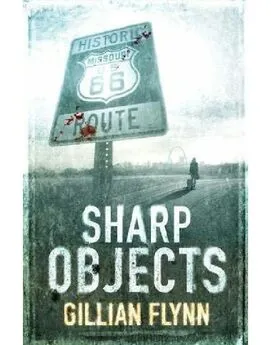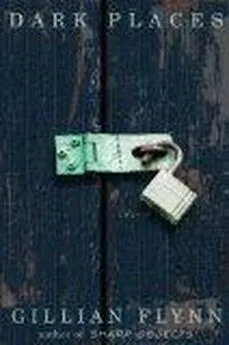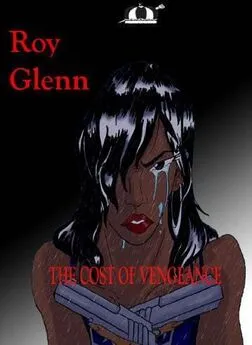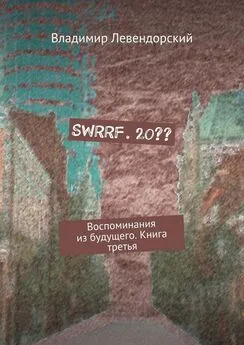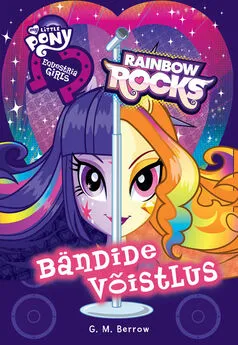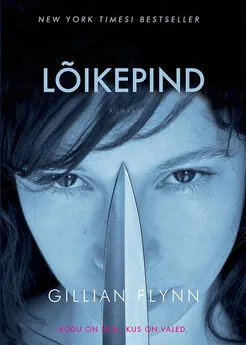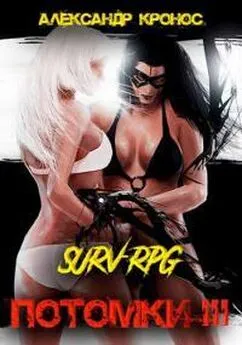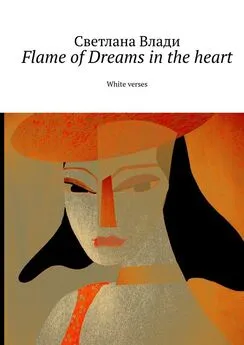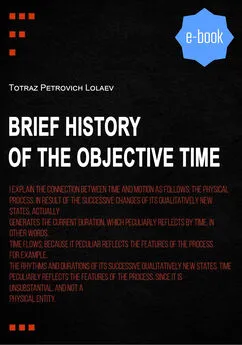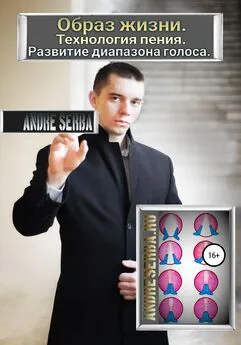Flynn, Gillian - Sharp_Objects
- Название:Sharp_Objects
- Автор:
- Жанр:
- Издательство:неизвестно
- Год:неизвестен
- ISBN:нет данных
- Рейтинг:
- Избранное:Добавить в избранное
-
Отзывы:
-
Ваша оценка:
Flynn, Gillian - Sharp_Objects краткое содержание
Sharp_Objects - читать онлайн бесплатно полную версию (весь текст целиком)
Интервал:
Закладка:
It would be hard to carry a child through these woods. Branches and leaves strangle the pathway, roots bump up from the ground. If Ann was a true girl of Wind Gap, a town that demands utmost femininity in its fairer sex, she’d have worn her hair long down her back. It would have tangled itself in the passing brush. I kept mistaking spiderwebs for glimmering strands of hair.
The grass was still flattened along the point where the body was discovered, raked through for clues. There were a few recent cigarette butts that the idle curious had left behind. Bored kids scaring each other with sightings of a madman trailing bloody teeth.
In the creek, there’d been a row of stones that had snagged the clothesline around Ann’s neck, leaving her tethered and floating in the stream like the condemned for half a night. Now, just smooth water rolling over sand. Mr. Ronald J. Kamens had been proud when he told me: The townsfolk had pried out the rocks, loaded them in the back of a pickup, and smashed them just outside town. It was a poignant gesture of faith, as if such destruction would ward off future evil. Seems it didn’t work.
I sat down at the edge of the creek, running my palms over the rocky soil. Picked up a smooth, hot stone and pressed it against my cheek. I wondered if Ann had ever come here when she was alive. Maybe the new generation of Wind Gap kids had found more interesting ways to kill summers. When I was a girl, we swam at a spot just downstream where huge table rocks made shallow pools. Crawdads would skitter around our feet and we’d jump for them, scream if we actually touched one. No one wore swimsuits, it took too much planning. Instead you just rode your bike home in soaked shorts and halters, shaking your head like a wet dog.
Occasionally older boys, equipped with shotguns and stolen beer, would tromp through on their way to shoot flying squirrels or hare. Bloody pieces of meat swung from their belts. Those kids, cocky and pissed and smelling of sweat, aggressively oblivious of our existence, always compelled me. There are different kinds of hunting, I know now. The gentleman hunter with visions of Teddy Roosevelt and big game, who retires from a day in the field with a crisp gin and tonic, is not the hunter I grew up with. The boys I knew, who began young, were blood hunters. They sought that fatal jerk of a shot-spun animal, fleeing silky as water one second, then cracked to one side by their bullet.
When I was still in grammar school, maybe twelve, I wandered into a neighbor boy’s hunting shed, a wood-planked shack where the animals were stripped and split. Ribbons of moist, pink flesh dangled from strings, waiting to be dried for jerky. The dirt floor was rusted with blood. The walls were covered with photographs of naked women. Some of the girls were spreading themselves wide, others were being held down and penetrated. One woman was tied up, her eyes glazed, breasts stretched and veined like grapes, as a man took her from behind. I could smell them all in the thick, gory air.
At home that night, I slipped a finger under my panties and masturbated for the first time, panting and sick.
Chapter Two
Happy Hour. I gave up on the search and stopped off at Footh’s, the town’s low-key country bar, before dropping by 1665 Grove Street, home of Betsy and Robert Nash, parents of Ashleigh, twelve; Tiffanie, eleven; the deceased Ann, forever nine; and six-year-old Bobby Jr.
Three girls until, at last, their baby boy. As I sipped my bourbon and cracked peanuts, I pondered the growing desperation the Nashes must have felt each time a child popped out without a penis. There was the first, Ashleigh, not a boy, but sweet and healthy. They’d always wanted two anyway. Ashleigh got a fancy name with extravagant spelling and a closet full of frosting-cake dresses. They crossed their fingers and tried again but still got Tiffanie. Now they were nervous, the welcome home less triumphant. When Mrs. Nash got knocked up once again, her husband bought a tiny baseball glove to give the lump in her belly a nudge in the right direction. Imagine the righteous dismay when Ann arrived. She got slapped with some family name—didn’t even get the extra e to ornament it a bit.
Thank goodness for Bobby. Three years after the disappointing Ann—was he an accident or one last shot of brio?—Bobby was given his dad’s name, was doted on, and the little girls suddenly realized how extraneous they were. Especially Ann. No one needs a third girl. But now she’s getting some attention.
I took my second bourbon in one smooth shot, unclenched my shoulders, gave my cheeks a quick slap, got in my big blue Buick, and wished for a third drink. I’m not one of those reporters who relishes picking through people’s privacy. It’s probably the reason I’m a second-rate journalist. One of them, at least.
I still remembered the way to Grove Street. It was two blocks behind my high school, which served every kid within a seventy-mile radius. Millard Calhoon H.S. was founded in 1930, Wind Gap’s last cough of effort before sinking into the Depression. It was named for the first mayor of Wind Gap, a Civil War hero. A Confederate Civil War hero, but that made no never mind, a hero nonetheless. Mr. Calhoon shot it out with a whole troop of Yankees in the first year of the Civil War over in Lexington, and single-handedly saved that little Missouri town. (Or so implies the plaque inside the school entrance.) He darted across farmyards and zipped through picket-fenced homes, politely shooing the cooing ladies aside so they wouldn’t be damaged by the Yanks. Go to Lexington today and ask to see Calhoon House, a fine bit of period architecture, and you can still spot northern bullets in its planks. Mr. Calhoon’s southern bullets, one assumes, were buried with the men they killed.
Calhoon himself died in 1929 as he closed in on his centennial birthday. He was sitting at a gazebo, which is now gone, in the town square, which has been paved over, being feted by a big brass band, when suddenly he leaned into his fifty-two-year-old wife and said, “It’s all too loud.” Then he had a massive coronary and pitched forward in his chair, smudging his Civil War finery in the tea cakes that had been decorated with the Stars and Bars just for him.
I have a special fondness for Calhoon. Sometimes it is all too loud.
The Nashs’ house was much as I’d expected, a late-’70s piece of generica like all the houses on the west side of town. One of those homely ranch houses featuring the garage as its central point. As I drove up, a messy blond boy was sitting in the driveway in a Big Wheel several sizes too small for him, grunting with the effort to pedal the plastic bike. The wheels just spun in place under his weight.
“Want a push?” I said as I got out of the car. I’m not good with children as a rule, but it seemed an attempt wouldn’t hurt. He looked at me silently for a second, stuck a finger in his mouth. His tank top slipped up as his round belly popped out to greet me. Bobby Jr. looked stupid and cowed. A boy for the Nashes, but a disappointing one.
I stepped toward him. He jumped off the Big Wheel, which remained clamped to him for a few steps, jammed on his body as it was, then clattered off sideways.
“Daddy!” He ran wailing toward the house as if I’d pinched him.
By the time I reached the front door, a man appeared. My eyes focused behind him, at a miniature fountain gurgling in the hallway. It had three tiers shaped like shells, with a statue of a little boy perched on top. Even from the other side of the screen door, the water smelled old.
“Can I help you?”
“Are you Robert Nash?”
He looked suddenly wary. It was probably the first question the police had asked him when they told him his daughter was dead.
“I’m Bob Nash.”
“I’m so sorry to bother you at home. I’m Camille Preaker. I’m from Wind Gap.”
“Mmhmmm.”
“But now I’m with the Daily Post in Chicago. We’re covering the story…. We’re here because of Natalie Keene, and your daughter’s murder.”
I braced for yelling, door slams, curses, a punch. Bob Nash stuffed both hands deep into his front pockets and leaned back on his heels.
“We can talk in the bedroom.”
He held the door open for me, and I began picking my way through the clutter of the living room, laundry baskets spurting over with rumpled sheets and tiny T-shirts. Then past a bathroom whose centerpiece was an empty roll of toilet paper on the floor, and down a hallway spackled with fading photos beneath grimy laminate: little blonde girls crowded dotingly around a baby boy; a young Nash with his arm stiffly circled around his new bride, each of them holding the edge of a cake knife. When I got to the bedroom—matching curtains and bedclothes, a tidy dresser—I realized why Nash had chosen the spot for our interview. It was the one area of the house that held a degree of civilization, like an outpost on the edge of a despairing jungle.
Nash sat on one edge of the bed, I on the other. There were no chairs. We could have been day players in an amateur porn flick. Except we each had a glass of cherry Kool-Aid he’d fetched for us. Nash was a well-kept man: clipped mustache, receding blond hair held down with gel, a glaring green polo tucked into jeans. I assumed he was the one who maintained the order of this room; it had the unadorned neatness of a bachelor trying very hard.
He needed no foreplay for the interview, and I was grateful. It’s like sweet-talking your date when you both know you’re about to get laid.
“Ann’d been riding her bike all last summer,” he started without prompting. “All summer just around and around the block. My wife and me wouldn’t let her go no further. She was only nine. We are very protective parents. But then at the end, right before she started school, my wife said fine. Ann had been whining, so my wife said fine, Ann could ride to her friend Emily’s house. She never got there. It was eight o’clock before we realized.”
“What time had she left?”
“About seven. So somewhere along the way, in those ten blocks, they got her. My wife will never forgive herself. Never.”
“What do you mean, they got her?”
“Them, him, whatever. The bastard. The sick baby killer. While my family and I sleep, while you drive around doing your reporting, there is a person out there looking for babies to kill. Because you and I both know the little Keene girl isn’t just lost.”
He finished the rest of his Kool-Aid in one belt, wiped his mouth. The quotes were good, if overpolished. I find this common, and in direct proportion to the amount of TV a subject watches. Not long ago, I interviewed a woman whose twenty-two-year-old daughter had just been murdered by her boyfriend, and she gave me a line straight from a legal drama I happened to catch the night before: I’d like to say that I pity him, but now I fear I’ll never be able to pity again.
“So Mr. Nash, you have no thoughts of anyone who might have wanted to harm you or your family by hurting Ann?”
“Miss, I sell chairs, ergonomic chairs for a living—over the phone. I work out of an office over in Hayti, with two other fellas. I don’t meet anyone. My wife does part-time office work at the grade school. There’s no drama here. Someone just decided to kill our little girl.” He said the last part beleaguredly, as if he’d given in to the idea.
Bob Nash walked to the sliding glass door off the side of the bedroom. It led onto a tiny deck. He opened the door but stayed inside. “Might be a homo did it,” he said. The word choice was actually a euphemism in these parts.
Читать дальшеИнтервал:
Закладка:
